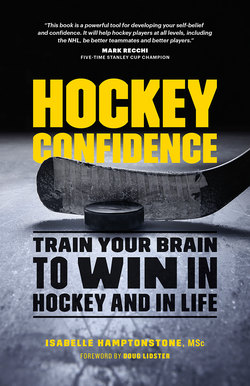Читать книгу Hockey Confidence - Isabelle Hamptonstone MSc. - Страница 11
На сайте Литреса книга снята с продажи.
ОглавлениеTWO
ANXIETY: ONE OF THE GREATEST TOOLS FOR YOUR SUCCESS
The Chattering Monkey of the Mind
“Practically everybody knows what it’s like to feel anxious, worried, nervous, afraid, uptight, or panicky. Often, anxiety is just a nuisance, but sometimes it can cripple you and prevent you from doing what you really want with your life. But I have some great news for you: You can change the way you feel.”
DAVID D. BURNS, Stanford University School of Medicine
WE ALL KNOW athletes who, with more confidence, could play so much better and enjoy their game so much more. Although they may have skill or natural talent, they question themselves, they doubt themselves. They make mistakes in games that they never would in practice, and they are harder on themselves than anyone else. It’s as if they have a chattering monkey sitting on their shoulder, giving a running commentary on how well they are not doing. The monkey is constantly telling them that they are not good enough, and that monkey is causing mayhem in their mind, causing them to experience performance anxiety.
You know those players, the ones who find it hard to feel good about their game. No matter how their friends, families, and coaches do their best to help, somehow they still feel like they are a failure. Their game may have a strong physical and technical base, but that lack of confidence affects their playing, their happiness, and their state of mind.
And their greatest fears about failure come true. They don’t get the results they expect of themselves. They feel frustrated and confused. They don’t know how to get back to finding the fun in their game and getting the results they deserve. Their self-esteem becomes extremely low and affects the person they want to be. They don’t look at themselves the way others do, and they develop more and more anxiety. Let me tell you about a hockey player who learned to overcome debilitating anxiety to become a key player in the success of his team.
Case Study: Winning from Within
“Whether I fail or succeed shall be no man’s doing but my own. I am the force; I can clear any obstacle before me or I can be lost in the maze. My choice; my responsibility; win or lose, only I hold the key to my destiny.”
ELAINE MAXWELL, consultant, coach, and trainer
IN 2011, GOALIE Cam Lanigan took part in a Calgary Flames development camp. Although the camp was the highlight of his career to that point, he felt almost deadlocked after being there. He found himself unable to get back to top form, and his game took a downward turn that became a spiral. It seemed that he had lost his game, and he fell into a deep funk.
Cam was picked up by the Kamloops Blazers CHL team. After 16 games with them, his statistics were 3-9-0 (wins, losses, and ties) and 0.843 save percentage rate (the top goalies in his league at the time all had 0.9 and higher)—numbers he was desperate to improve. As this performance level continued through the season, Cam was full of self-criticism and constantly faced disappointment on the ice. Because of his anxiety, he almost gave up. Jacques Plante, one of the most important innovators in hockey, knows from experience how tough it can feel to be a hockey goalie. He says: “Goaltending is a normal job, sure. How would you like it in your job if every time you made a small mistake, a red light went on over your desk and 15,000 people stood up and yelled at you?”1
What Cam did next was remarkable, and it revealed true strength of character and true grit. Instead of giving up, he took responsibility for getting back on track, back to his best self. With the help and support of his parents; his dedicated and focused goalie coach, Dan De Palma; and me, his brain trainer, Cam put together a plan to get better. Cam decided to enlist us to support him as a personal performance team. The state of his mind was high on his list of priorities, and Cam took responsibility for training his brain to create a whole new mindset. He began to develop trust in the advice of his team. He realized that by learning the most efficient ways to deal with his anxiety, he could face his embarrassment and guilt. Cam and I worked together so that he could learn to retrain his brain, and we formulated a strategy that would see his self-esteem rise. On the ice, the results began to show.
